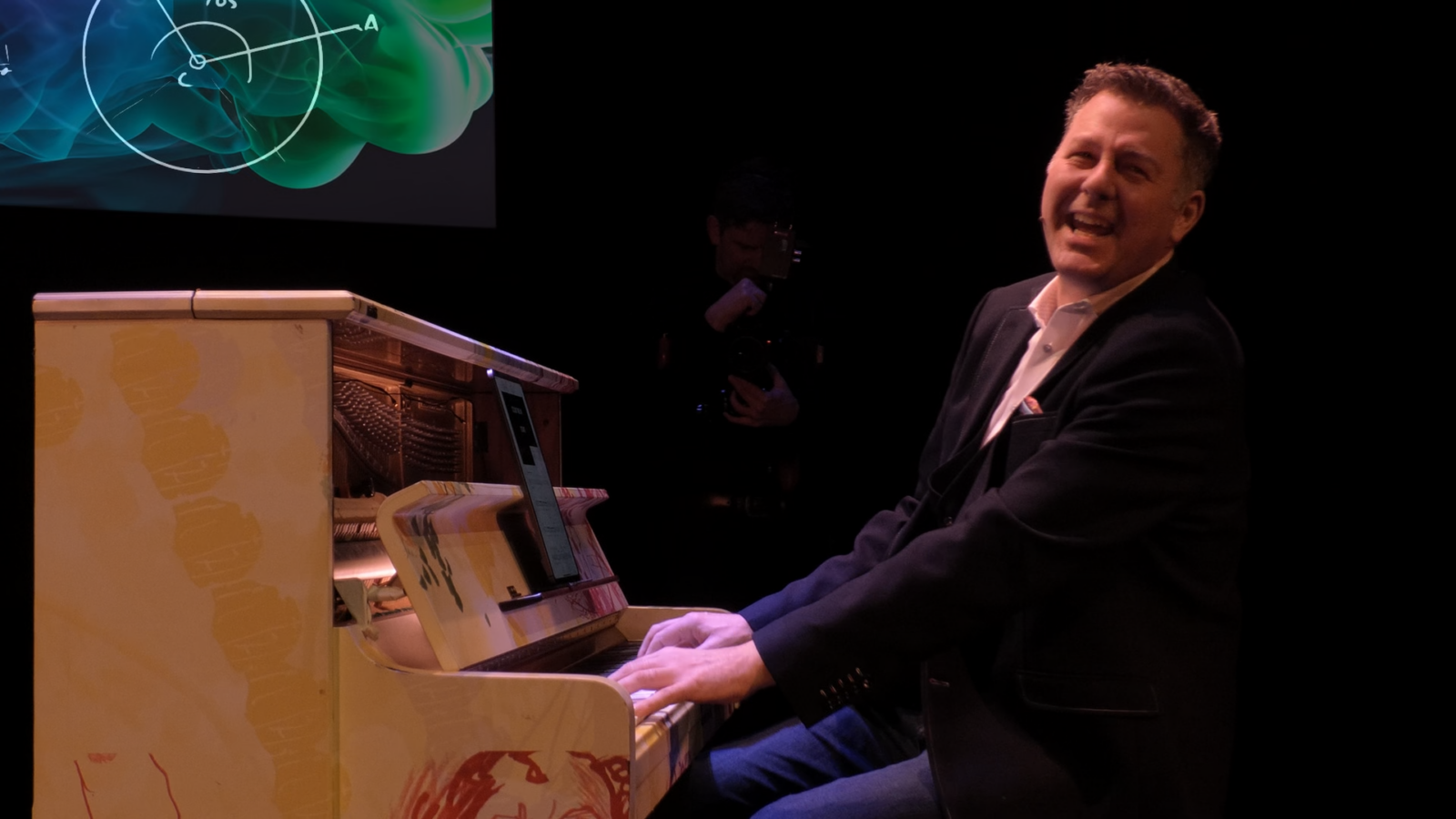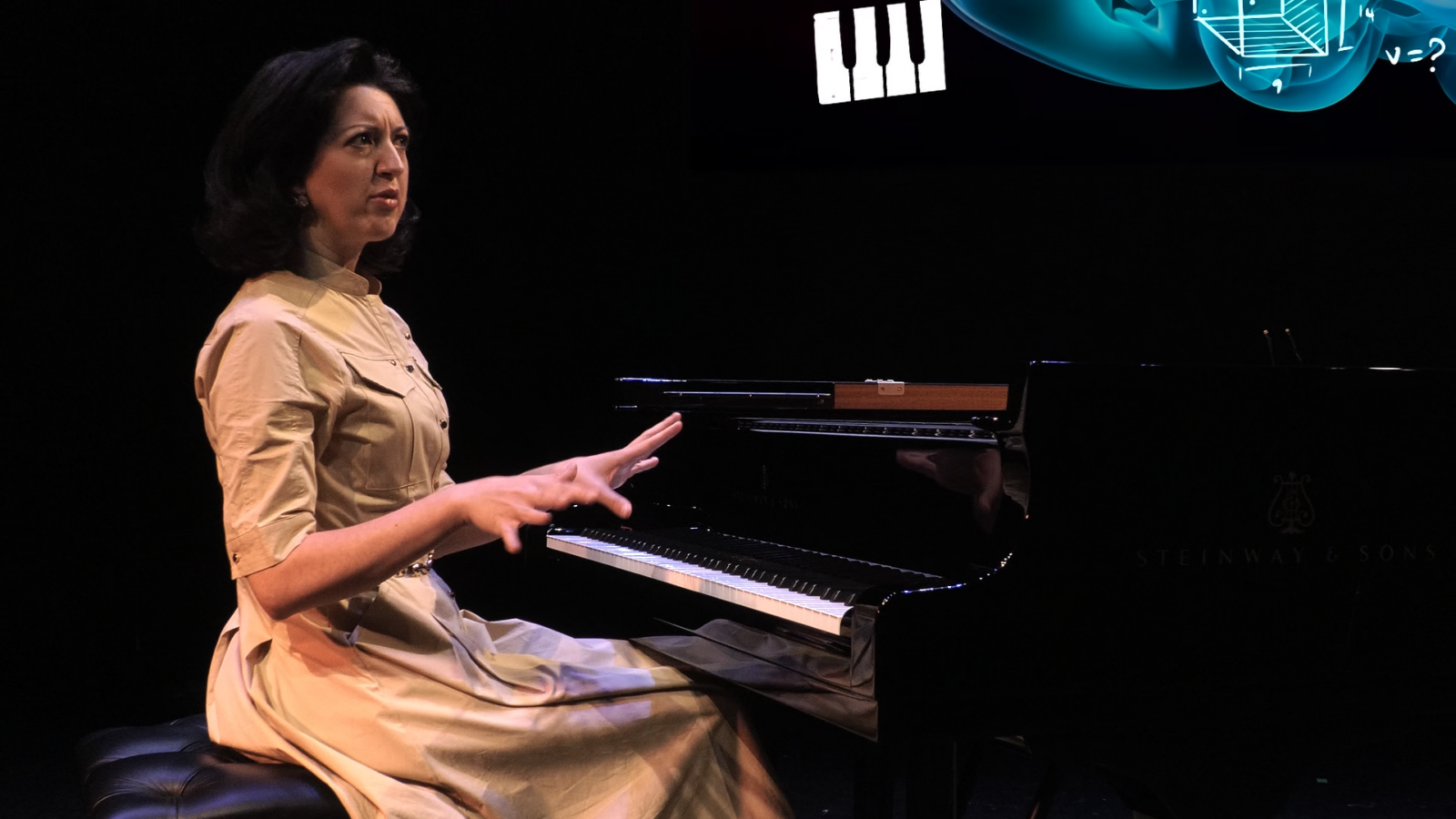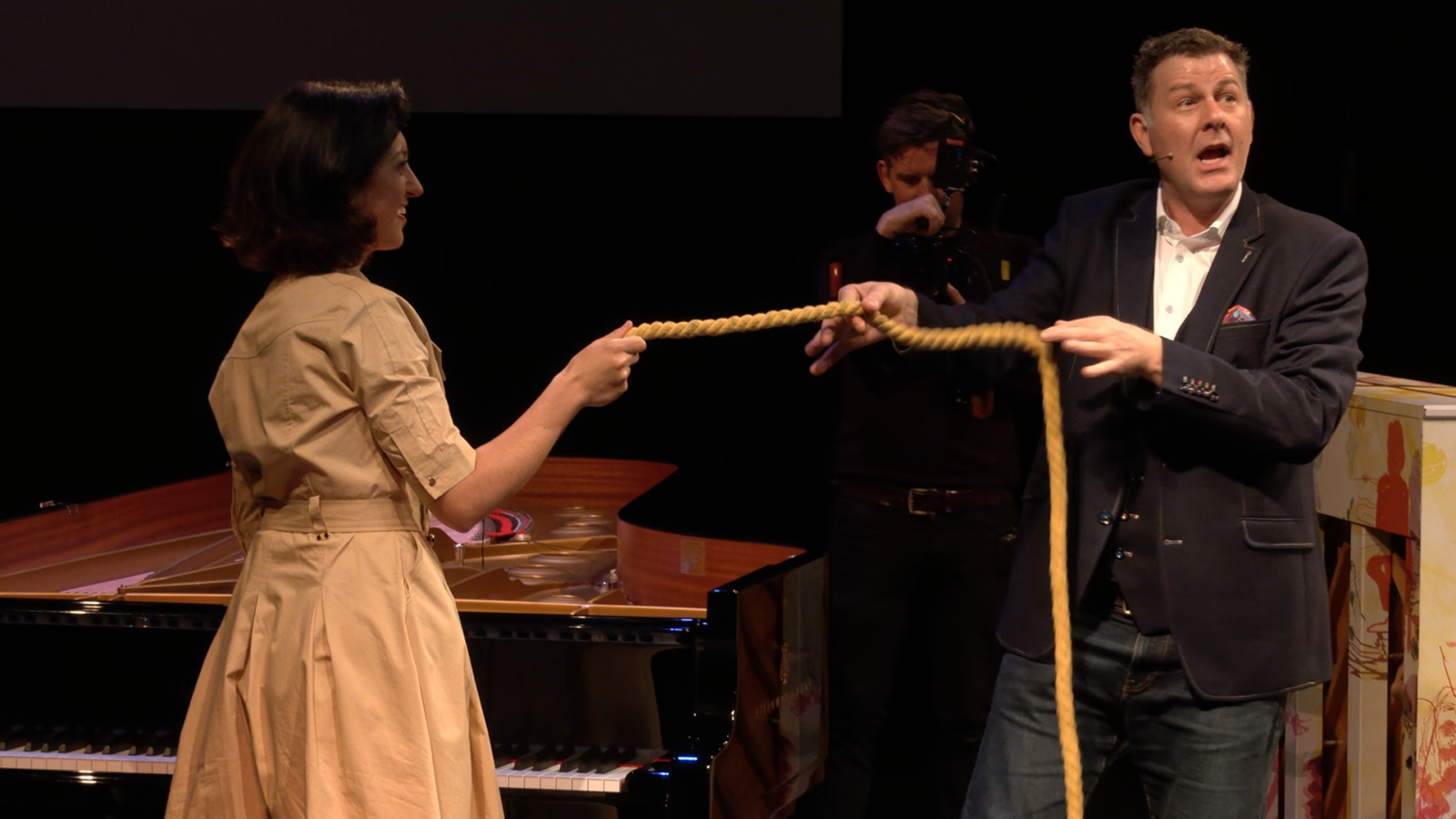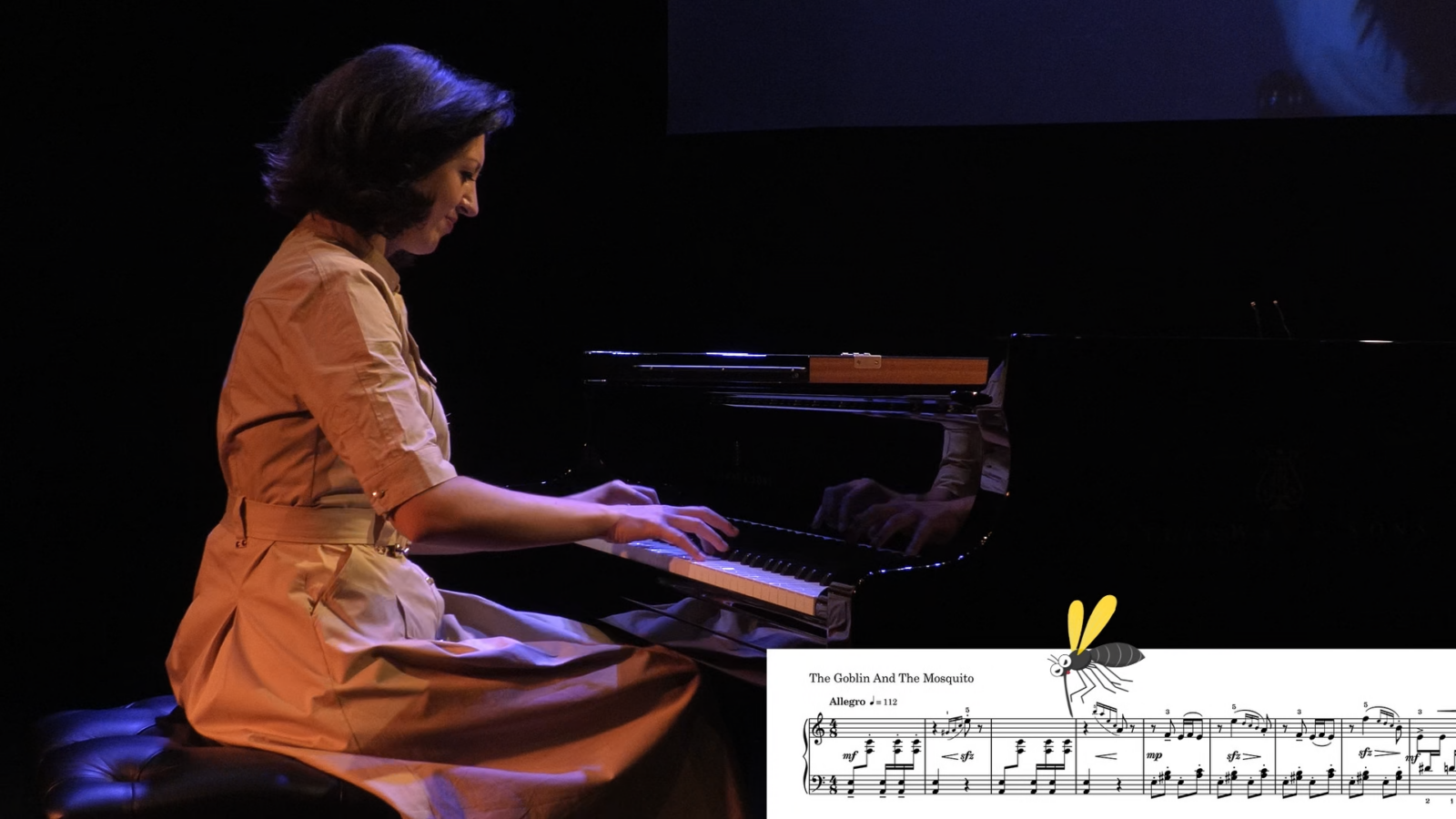We catch up with Count Me In creators and collaborators, Alexandra Dariescu and Tim Redmond to talk about their hit-show that combines music, maths, and a little bit of mayhem! Count Me In is a lively, interactive show for children aged 8–11, and an online version will soon launch for schools in the UK and US in partnership with the Lang Lang International Music Foundation.
What was the spark behind ‘Count Me In’? And, what made you want to make a show for a younger audience?
T: I’ve been writing orchestral education shows for children for many years — but I was really interested in creating something for the piano and to make the experience as interactive as possible. Alexandra Dariescu is someone I’ve worked with many times and I just knew that her engaging personality and extraordinary musicianship would be perfect for Count Me In.
A: Having created and produced The Nutcracker and I for piano, ballerina and digital animation, I am hugely passionate about merging different art forms to inspire the younger generation. The inspiration for Count Me In came from my own childhood experiences where music and math were both integral parts of my education. When my brilliant friend Tim Redmond and I started talking about creating this show, we knew straight away we wanted to create something that bridges these two seemingly different worlds in a fun and engaging way. The idea was to spark curiosity and show children that math is not just numbers and equations, but it can be magical and musical as well. I believe that by engaging younger audiences, we can foster a lifelong love for learning and creativity.
Being in the audience when ‘Count Me In’ was performed in Leeds, it’s safe to say the audience reaction was bonkers! Kids were singing, shouting, and engaging with the show. Why do think children love ‘Count Me In’ so much?
A: Children love Count Me In because it is interactive and dynamic. The show is designed to be immersive, combining live music, storytelling and a lot of singing which captures their imagination. By involving our audience directly, we break the traditional barrier between performers and viewers, allowing children to feel they are a part of the story. This level of engagement is exciting and empowering for them and it will keep them hooked.
T: I think part of the fun is the idea that the audience are ‘in’ on the plot — that it’s only with their help that we’ll be able to persuade Alex to play the Grieg without an orchestra. There’s also a lot of audience engagement in this show — they help me with the maths, they sing a lot and they get to ask questions. Add all that up and what you get is a great buzz in the auditorium during the participation sections and absolute silence when they get to listen to Alex playing. It’s an amazing atmosphere.




What do you hope audiences will get out of watching ‘Count Me In’?
T: On one level, we want audiences to enjoy it purely as entertainment — it’s designed to be fun and engaging after all! But what I hope Alex and I also manage to put across is just how much we love what we do — that music, and the maths behind it, are endlessly fascinating and hugely fulfilling. We also include a wide variety of musical styles — from the reflective nature of the slow movement of Clara Schumann’s concerto, through the breathtaking virtuosity of the cadenza in the Greig, and with a nod towards musical theatre, jazz and rock anthems in some of the music I have written. What we hope to demonstrate is that whatever your musical tastes, the piano can be a part of it.
A: I hope audiences leave Count Me In with a sense of wonder and inspiration. I want children to see that learning can be fun and that music and math are interconnected in beautiful ways. Ideally, the show will ignite a passion for both subjects and encourage young minds to explore their interests with enthusiasm and creativity.
Has creating ‘Count Me In’ made you think differently about music and the role it plays in our education and our lives?
A: Absolutely. Creating Count Me In has deepened my appreciation for the role music plays in cognitive development and emotional expression. It has shown me that music can be a powerful tool for teaching and learning, making abstract concepts more tangible and accessible. The process has reinforced my belief in the importance of integrating the arts into education to cultivate well-rounded, imaginative thinkers. It’s shown me what a profound impact it can have on your minds.
T: It’s been a real reminder of the part music and the arts can play in all aspects of learning — that the creative subjects and humanities are inseparably linked to the STEM subjects and that creativity can unlock learning in the most profound ways.
What advice would you give someone starting out on the piano?
T: First of all, I’d say congratulations — you’ve made a lifelong friend. Playing the piano is something that you can enjoy forever. Secondly, I’d say the more time you can give it, the more it will give back. And thirdly, it’s all about the music! Remember when you’re sitting at the piano to express yourself, tell a story, be creative.
A: My advice would be to practice regularly and be patient with yourself. Learning an instrument is a journey that requires dedication and persistence. Enjoy the process, celebrate small achievements, and don’t be afraid to make mistakes — they are a crucial part of learning. The secret is to never give up. Also, find music that you love and are passionate about, as this will keep you motivated.
Which do you prefer — maths or music?
T: What is this? A trick question? You can’t have one without the other!
A: That’s a tough question because both are so intertwined in my work and my life. If I had to choose, I would say music, because it is my first love and my primary form of expression. However, math has always fascinated me, and I love how it underpins so much of what we do in music.
You’re going to be bringing the show to schools in the US this autumn. How do you think kids there are going to react to a show from Leeds?
A: They will love it! I’m so proud we created this wonderful show in Leeds and collaborating with the Leeds International Piano Competition and Tim has been a dream! I believe children in the US will react with the same excitement and enthusiasm as those in Leeds. The themes of curiosity, creativity, and the joy of discovery are universal. I’m excited to see how the show resonates with them and to hear their unique perspectives and insights.
T: I hope that they are inspired by the idea that halfway round the world, young people the same age are learning about exactly the same things. When we’re in education, it’s easy to be focused on how things are done in our school, our town, our district, our country. I hope Count Me In is an opportunity to see a bit more of the bigger picture and to be reminded that music and maths are totally universal languages.
If you could sum up ‘Count Me In’ in 3 words, what would they be?
A: Fun, informative, interactive!
T: Piano + music + maths = so much fun
Are you interested in Count Me In coming to your school?
Contact [email protected] for more information.